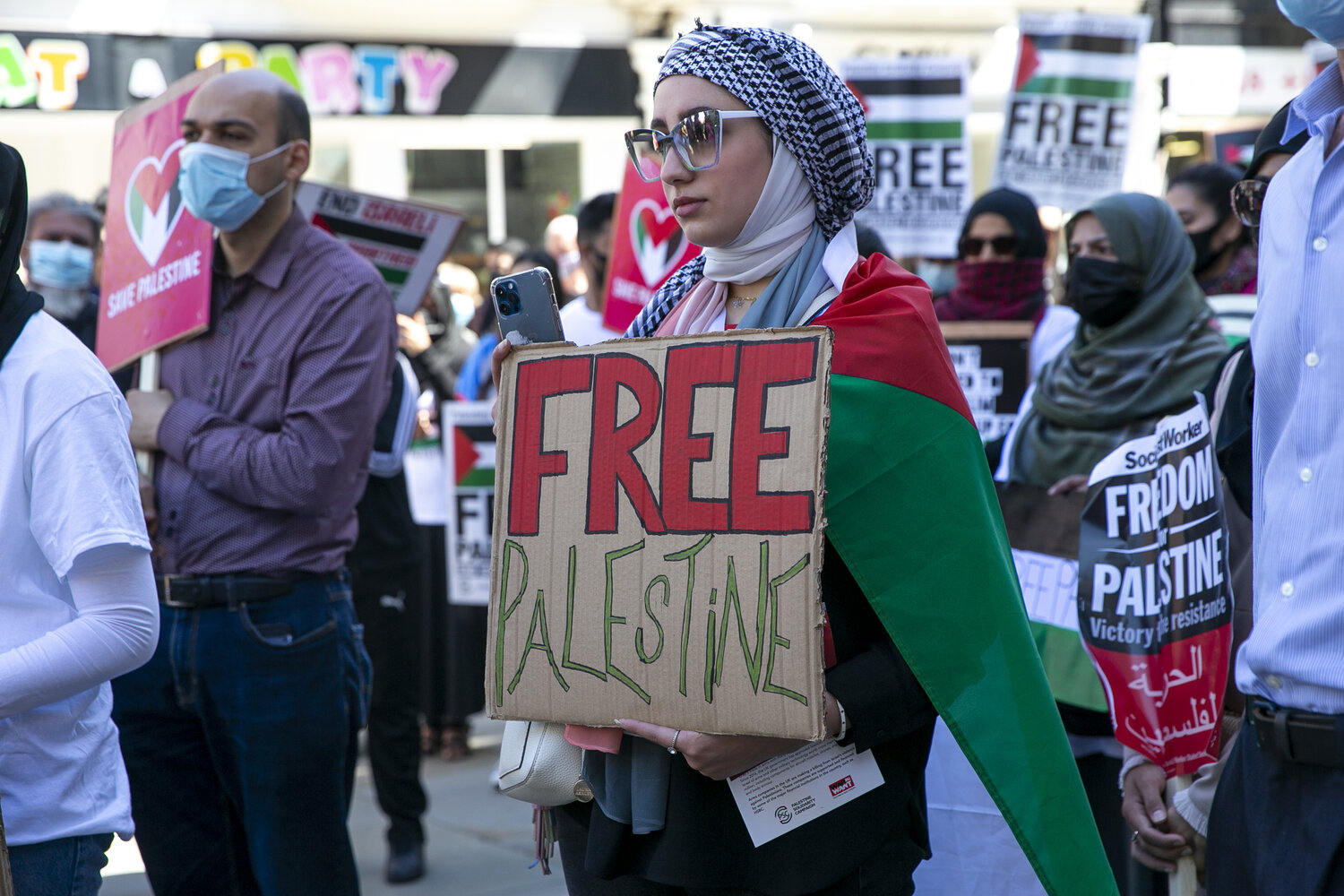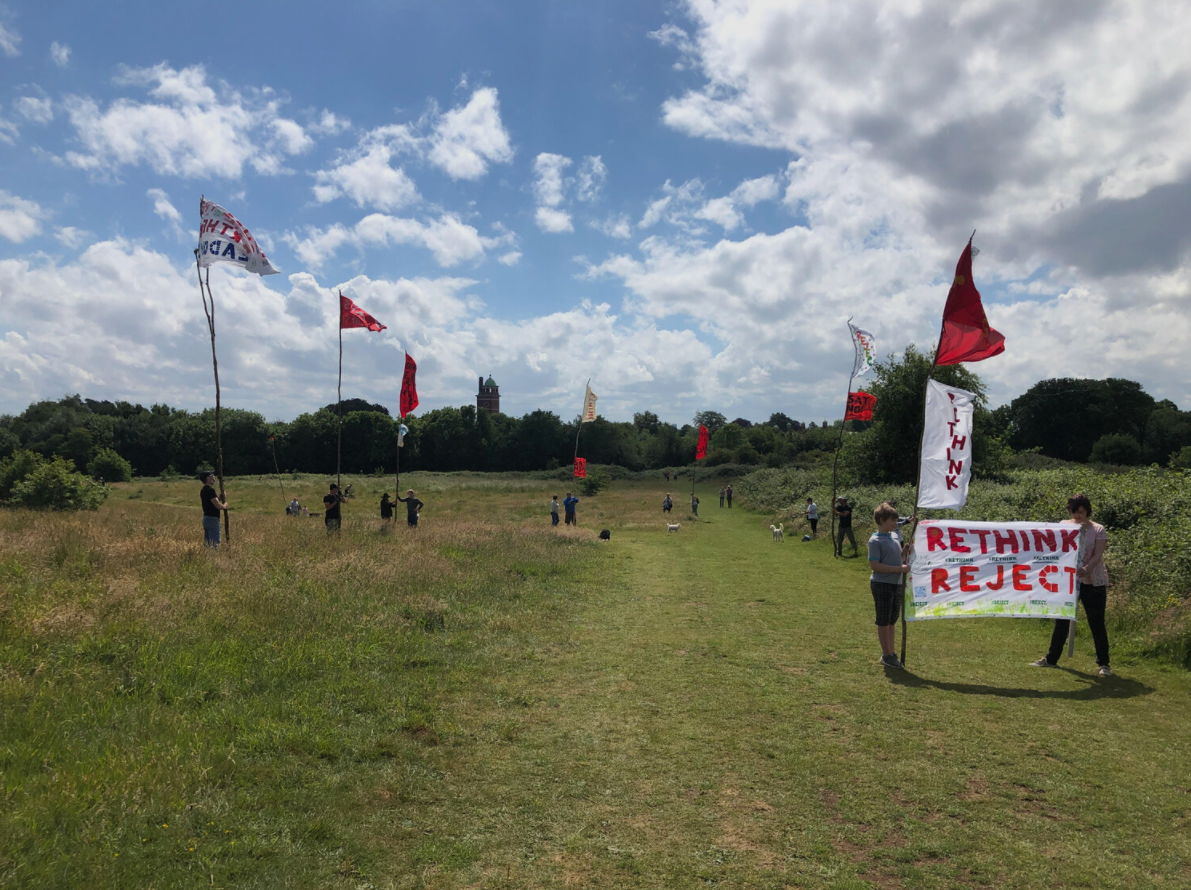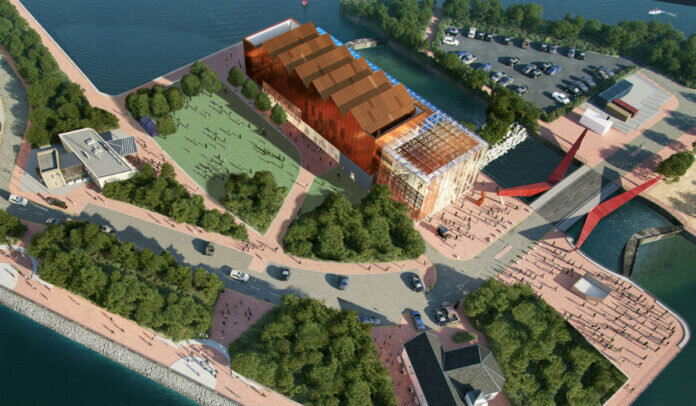
Young Muslim Women Are at the Forefront of a Multiracial Movement for Palestine
A woman holds a homemade placard at a Stand Up For Palestine protest in Newport on Saturday 5th June. Photo: Tom Davies
MUSLIM YOUTH, AND PARTICULARLY WOMEN, ARE AT THE HEART OF A BUOYANT NEW MOVEMENT IN WALES AND ELSEWHERE AGAINST THE ISRAELI OPPRESSION OF PALESTINIANS. THEY HAVE BEEN ORGANISING AGAINST A BACKDROP OF ISLAMOPHOBIA AND THE HOSTILE PREVENT PROGRAMME.
“We got to free Palestine!” shouts Sana, a Muslim high school student from Cwmbran.
“They’re dragging people out of their houses, they’re bombing all the families and kids, kicking women out of their homes.”
She was screaming the words loud and clear, so as to be heard over the throng of people marching down St Mary St, Cardiff, on a sunny Saturday at the end of May.
It was the second protest in as many weeks in the Welsh capital with over 1,000 people in attendance, held in response to the sudden escalation in the Israeli bombing of Gaza.
“They [Israel] have been doing it for 73 years,” she continues, referring to the Nakba, or Catastrophe, the violent programme of ethnic cleansing that killed 15,000 Palestinians, drove 750,000 from the land and created the modern state of Israel through destruction of around 530 Palestinian villages and cities.
“It’s finally time for them to be free!” shouts Sana, who is standing alongside three of her friends.
In her hand were a batch of leaflets from the Palestine Solidarity Campaign that she was rapidly handing out to passers-by. I ask if she is part of the group and she replies no; she has just taken them off a stall moments earlier and wanted to distribute them.
“It’s been amazing,” she says, referring to the huge protest behind her. “So many people have come together. Not just Muslims; all the humans have come together to support Palestine. It’s honestly amazing.”
Sana lives in Cwmbran, but goes to Caerleon comprehensive near Newport. After witnessing the events of previous weeks, where 248 Palestinians, including 66 children were killed, and more than 1,900 people wounded, from Israeli air and artillery attacks, she felt she had to come to protest and bring her friends with her.
“Our school friends are non Muslim,” she says, pointing to the young woman next to her. “My friend here is non Muslim, and she’s come to support us as well.”
Asked about First Minister Mark Drakeford’s near total silence on Gaza, Sana in damming: “He should show Muslims he cares. Wales is full of different cultures and it’s amazing that different cultures have come to support us, but the government needs to wake up.”
She hits out at the BBC too, who’s offices she has just picketed with hundreds of others: “Shame on you BBC, they are not doing anything about it.”

The presence of Sana and her friends are indicative of a wider trend of young people taking centre stage in the recent wave of huge Palestine protests, often with Muslim women, alongside men, at the forefront. Their actions confound the Islamophobic narrative, fostered by the liberal establishment over two decades and picked up by the far right, that Islamic culture is uniquely sexist and that Muslim women have very little agency of their own.
Yasmin had travelled from Swansea with her friend to be at the protest.
“You don’t have to be Muslim to be at this protest, it’s not a religion thing, this is ethnic cleansing,” she says. “This has been going on for so many years. It’s their land and Israel has no right to remove them from their land. Innocent people are dying, children are dying.”
Like Sana, Yasmin is furious with the BBC. “The BBC are calling it a clash. It’s not a clash, there’s no clash. In Gaza they have nothing to fight back with. Innocent people are dying because of what Israel is doing.”
“What if Israel came to the UK and started taking us out of our homes,” she exclaims. “We wouldn’t like it, we would fight back.”

School, college & university students key to the movement
The protests that have swept Wales in recent weeks have been made up of young and old people, and those of different ethnicities and genders. Activity among the whole Muslim youth and the community in general has been key, and been helped by the easing of lockdown and the ability to join Friday prayer at Mosques.
One man, who was helping to carry the large Palestine banner at the front of the protest, said he was a Cardiff University student from Oman.
He attends a Mosque in the City centre near the university, and says that everyone there was talking about Palestine and the protests: “They are all raising their voices for Palestine,” he tells me. “Before they didn’t know,” he says. “And now social media starts to show what’s happening there.”
Elsewhere, near the front of the front of the protest, was group of young Muslim women from St Teilo’s high school in Cardiff. They moved along with the crowd, loudly chanting ‘Free Palestine” and “End the Occupation.”
“We need to make a move and do something for Palestine” one said, adding that they had a lot of friends from the school who had come to the protest. Asked if they would organise a walkout in the school, they said they wanted to but were unsure whether or not it would be possible.
Meanwhile, in Newport on Saturday, a group of four young Muslim women, Taz, Pritly, Safaa and Anusha, who all attend the Coleg Gwent sixth form college, were proud to attendant the Palestine solidarity protest in the city.
“Were here to protest for Palestinian rights. There’s a lot of oppression towards Palestinians and the Israelis are claiming to want their land back but you know, it wasn’t their land in the first place,” one said.
“We’re raising awareness for people, they’re finding out more about it,” they continued. “There’s so many protests around the world and I feel it is actually going to make a difference. We’ve already made a bit of a difference as it is with the ceasefire.”
Some in the group had been to the previous protest in Cardiff, and explained how important it was to be part of this re-energised Palestine solidarity movement.
“I just feel like it was so nice to see everyone wanting the same thing,” one said, referring to the Cardiff march two weeks prior. It’s nice to see so many different cultures and people at these events.”

Clampdown on youth protests
It is students like these, often motivated after attending protests or politicised through the BLM movement, who have also been leading the way when it comes to school walkouts. This activism has taken place against the backdrop of a hostile British state which has targeted young Muslims through the Prevent programme in schools.
Students have been faced with widespread intimidation from school authorities as well, with posters binned and pupils told not to wear badges or organise lunchtime protests. Some have even been threatened with being thrown out of their GCSE exams if they don’t comply.
One parent, whose daughter goes to Fitzalan High School in Cardiff, told voice.wales that students there had been put off engaging in Palestine solidarity activity by the head at the school, who told students not to take sides against Israel and that activity couldn’t happen on school property.
Much of the attacks on pro-Palestine activism comes on the back the UK Government’s Prevent programme in schools, which overwhelmingly targets Muslim students.
Ilyas Nagdee, who campaigns against the Prevent strategy, told Middle East Eye recently that since putting a call out on Twitter, he had received a hundred requests for help from children and their parents worried about schools clamping down on Palestine solidarity actions.
“The cases we have received span the entire length of the country with hotspots where there are sizeable Muslim communities,” he told the site. “The sanctions applied are wide in range, from young people being spoken to in class or given lunchtime isolation all the way to exclusions.”
He added that many parents were worried that Prevent would get involved as a result of their children raising opposition to Israel in schools, leading to potential home visits from the police. In addition, a lecturer at Queen Mary University in London who studies Prevent in schools said the attack on students over Palestine came directly from the programme’s existence in schools.
“What we are seeing now is a product of years of Prevent trying to micro-manage political conversations and debates among young children and adults on issues it deems contentious and what it perceives as deviating from the prescribed norm,” the lecturer told Middle East Eye.
What is clear from the explosion of action in solidarity for Palestine is that many young Muslims are deciding to take a stand in the face of institutionalised opposition from the state. They are doing so alongside their non-Muslim friends, who themselves are learning about the situation in Palestine, Israel and Gaza for the first time.
It is this unity that worries the British establishment, and the crackdown on campus organisation is part of their response.
For anyone who wants to see justice for Palestine, defending these young people, and ensuring that Muslims are not bullied into silence by programmes such as Prevent, is crucial.


